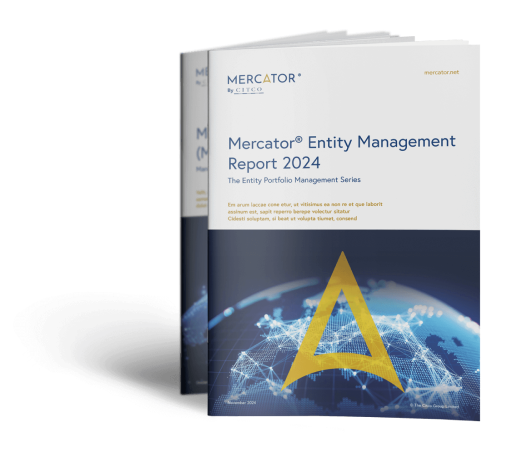The information contained in this document is marketing material and for informational purposes only. The information contained in this document is presented without any warranty or representation as to its accuracy or completeness and all implied representations or warranties of any kind are hereby disclaimed. Recipients of this document, whether clients or otherwise, should not act or refrain from acting on the basis of any information included in this document without seeking appropriate professional advice. The provision of the information contained in this document does not establish any express or implied duty or obligation between Citco and any recipient and neither Citco nor any of its shareholders, members, directors, principals or personnel shall be responsible or liable for results arising from the use or reliance of the information contained in this document including, without limitation, any loss (whether direct, indirect, in contract, tort or otherwise) arising from any decision made or action taken by any party in reliance upon the information contained in this document. © The Citco Group Limited, December 2024.
ESG Reporting in Croatia: Adapting to New Corporate Sustainability Rules
Croatia, in line with other EU member states, is poised for significant changes in its approach to Environmental, Social, and Governance (ESG) regulations. While local businesses have been cautious in embracing these shifts, developments at the European level are set to reshape the ESG landscape in Croatia.
Current State of ESG Reporting in Croatia
To date, ESG reporting in Croatia has been largely voluntary, with most companies addressing sustainability concerns based on specific business needs or stakeholder demands. The anticipated adoption of the EU’s Corporate Sustainability Reporting Directive (CSRD) was expected to introduce mandatory disclosure requirements for a broad range of businesses. However, the latest proposals from the European Commission suggest substantial changes, potentially reducing the number of affected companies and extending implementation deadlines.
Key Developments: CSRD Implementation and Its Implications
1. Revised CRSD Scope and Timeline
The original plan set a staggered implementation timeline for different types of companies. Large public-interest enterprises were to submit their first CSRD-compliant reports in 2025, followed by other large companies in 2026, and listed SMEs and other entities in 2027. However, the ‘Omnibus proposal’, published on the 26th of February 2025, suggests that only companies with over 1,000 employees would be subject to CSRD requirements, up from the original 250-employee threshold. This change could potentially exempt up to 80% of businesses originally covered by CSRD and may also lead to extended implementation deadlines.
2. Local Compliance and Enforcement Mechanisms
Croatia has integrated the CSRD framework into its national legislation through amendments to the Accounting Act (OG No. 85/2024), Audit Act (OG No. 127/2017, 27/2024, 85/2024), and Capital Markets Act (OG No. 65/18, 17/20, 83/21, 151/22, 85/24). These amendments align with EU reporting standards but include Croatia-specific penalties for non-compliance.
Fines range from €1,320 to €13,270 for companies, with additional fines applicable to responsible individuals within legal entities. The Croatian Financial Services Supervisory Agency (HANFA) will oversee enforcement, adding a robust component that holds companies and their management accountable.
3. Mandatory Assurance of ESG Data
Companies subject to CSRD in Croatia must obtain “limited assurance” of their sustainability data, requiring verification by certified auditors. This assurance level, though less stringent than financial audits, is designed to ensure the accuracy and reliability of sustainability disclosures.
4. Double Materiality and Reporting Scope
The CSRD introduces a “double materiality” standard, obliging Croatian companies to report not only on how sustainability issues impact their business but also on how their business impacts the environment and society. This dual approach requires companies to disclose data on a range of ESG metrics, including emissions, social impact, and governance practices, within a digital XBRL format for enhanced comparability and accessibility.
5. Corporate Sustainability Due Diligence Directive (CSDDD)
The CSDDD, adopted in July 2024, is expected to add mandatory due diligence requirements for large companies on human rights and environmental issues. While the original transposition deadline was set for the 26th of July 2026, new proposals suggest a potential delay until mid-2028. Additionally, the frequency of required supply chain due diligence assessments may be reduced from annually to once every five years.
While these adjustments would provide additional preparation time, Croatian businesses involved in supply chains will still need to align with evolving expectations from larger corporations.
Recommended Actions for Multinationals operating in Croatia
Despite the potential reduction of new sustainability and due diligence obligations, businesses should utilize available preparation time by:
- Conducting comprehensive ESG assessments
- Aligning supply chain policies with evolving EU standards
- Developing robust reporting frameworks
- Integrating ESG considerations into strategic planning
- For SMEs: Preparing for potential indirect impacts through supply chain pressures
Conclusions
While the proposed changes to EU ESG regulations may provide some relief and additional preparation time for Croatian businesses, the new rules will still increase sustainability reporting and due diligence requirements. Companies should use this period to strengthen their ESG practices, ensuring they are well-positioned to meet future regulatory requirements and stakeholder expectations.
Reda Murauske
Legal Team Manager, Mercator by Citco, Citco Mercator, UAB
Kristina Hyrla
Legal Officer, Mercator by Citco, Citco Mercator, UAB

